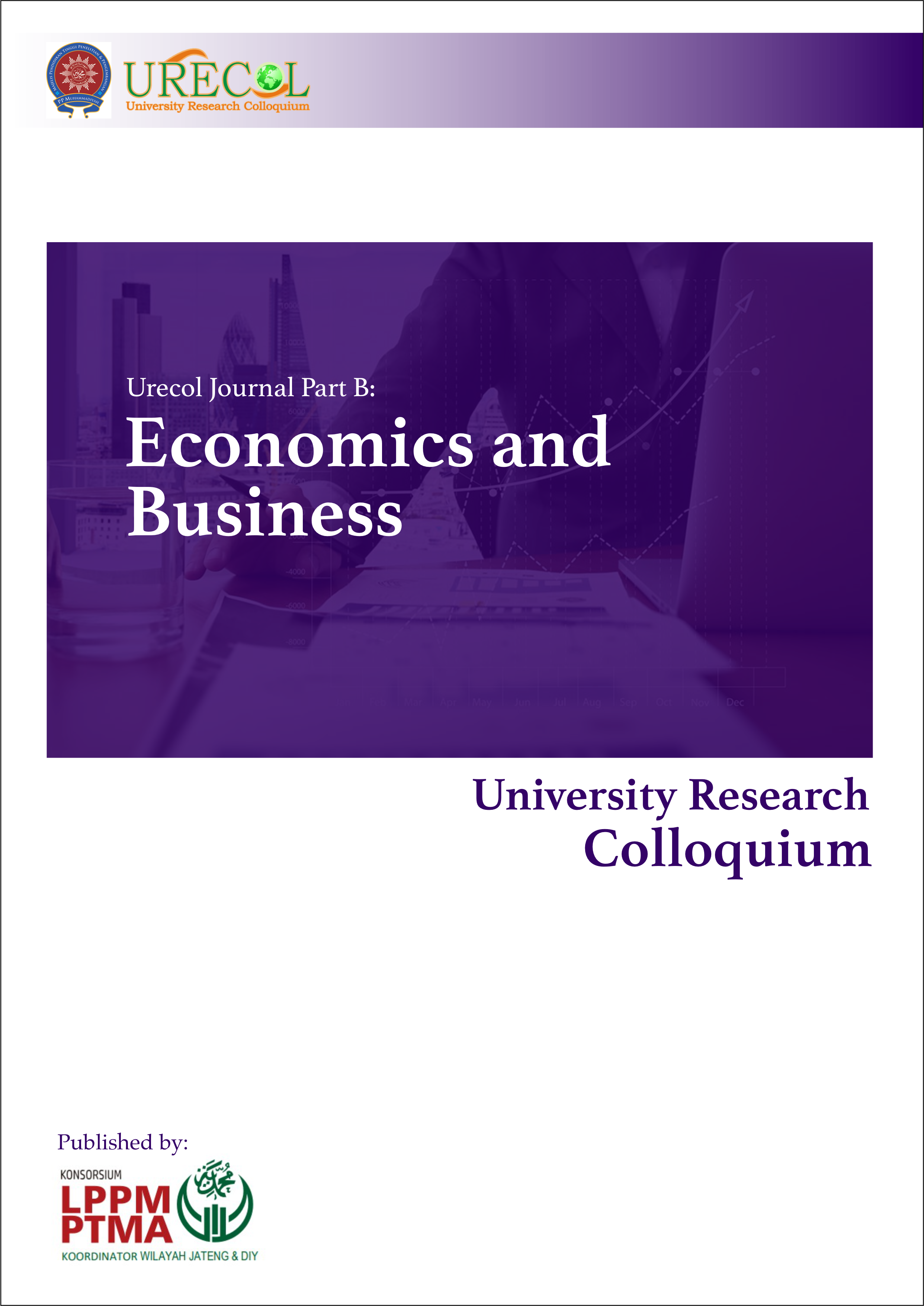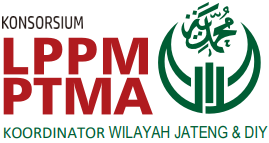The Influence of Religiosity, Organizational Culture, and Islamic Leadership Style on the Performance of Management of Student Organizations at the Faculty of Economics and Business, Muhammadiyah University, Surakarta
DOI:
https://doi.org/10.53017/ujeb.234Keywords:
Religiosity, Organizational culture, Islamic leadership style, Organizational management performanceAbstract
This study aims to analyze and determine the effect of the level of religiosity, organizational culture, and Islamic leadership style on the performance of student organization officials at the Faculty of Economics and Business, Muhammadiyah University, Surakarta. The independent variables in this study are religiosity, organizational culture, and Islamic leadership style. The performance of student organization officials is the dependent variable. This type of research is quantitative research, with a population of student organization management groups at the Faculty of Economics and Business, Muhammadiyah University of Surakarta. Samples were taken randomly with a minimum number of respondents of 100 students from all student organization administrators at the Faculty of Economics and Business, Muhammadiyah University of Surakarta. The sampling technique uses the theory of Hair which says that the minimum number of samples is 5 times the number of variables to be studied and analyzed. For analysis in this study using multiple linear regression analysis and data collection techniques through the distribution of questionnaires conducted online via Googleform. Based on the results of data processing assisted by the SPSS software, the results of the study were obtained through the t test, with the result that the religiosity variable had a positive and significant effect on the performance of the student organization committee of the Faculty of Economics and Business, Muhammadiyah University of Surakarta. Organizational culture variables have a positive and significant impact on the performance of student organization management at the Faculty of Economics and Business, Muhammadiyah University of Surakarta. As well as the Islamic leadership style variable does not have a positive and significant effect on the performance of student organization management at the Faculty of Economics and Business, Muhammadiyah University of Surakarta.
Downloads
References
C. O. S. Patricia, “Pengaruh Religiusitas Terhadap Kinerja Karyawan Melalui Motivasi,” vol. 3, no. 2, p. 6, 2021.
W. S. Rubai’ah and R. Lestari, “Pengaruh Penerapan Kerja Islami Terhadap Kinerja Karyawan,” Bandung Conference Series: Accountancy, vol. 2, no. 1, pp. 399–405, 2022.
Jati Waskito, “Faktor-faktor Pendorong Keniatan Pekerja Lansia untuk Melanjutkan Bekerja,” vol. 18, pp. 70–87, 2015.
A. F. Kusumawati, P. S. Akuntansi, F. Ekonomi, D. A. N. Bisnis, and U. M. Surakarta, “Disusun sebagai salah satu syarat menyelesaikan Program Studi Strata I pada Jurusan Akuntansi Fakultas Ekonomi dan Bisnis,” no. 23, 2019.
S. El Hafiz and Y. Aditya, “Kajian Literatur Sistematis Penelitian Religiusitas di Indonesia: Istilah, Definisi, Pengukuran, Hasil Kajian, serta Rekomendasi,” Indonesian Journal for The Psychology of Religion, vol. 1, no. 1, pp. 1–22, 2021, doi: 10.24854/ijpr428.
R. Maulana, “Analisis Pengaruh Religiusitas Terhadap Kinerja Karyawan PT. Bank Aceh Syariah,” UIN Ar-Raniry Banda Aceh, pp. 1–88, 2019.
I. Puspasiwi, U. Dwi, A. Wibowo, and I. F. Hamzah, “Pengaruh Religiusitas Dan Budaya Organisasi Terhadap Organizational Citizenship Behavior (Ocb) Pada Karyawan Toserba Pajajaran Kota Banjar The,” Jurnal Nasional, vol. 20, pp. 176–183, 2022.
A. A. Alfalah, Y. Z. Basri, T. Marianti, and ..., “The Effectof Company Culture, Religiosity, and Commitment on Performance Through Employee Satisfactionas Intervening Variableof Sharia Banking in Pekanbaru,” International Journal of …, vol. 1, no. 1, pp. 60–71, 2020.
A. Abbas, M. Saud, I. Usman, and D. Ekowati, “Servant leadership and religiosity: An indicator of employee performance in the education sector,” International Journal of Innovation, Creativity and Change, vol. 13, no. 4, pp. 391–409, 2020.
R. Wijayanti and M. Nurhayati, “The Effect of Employee Religiosity and Organizational Culture on Employee Performance with Intrinsic Motivation as a Mediation Variable in Bank Syariah Indonesia (BSI) Ex BNI Syariah Head Office,” European Journal of Business and Management Research, vol. 6, no. 5, pp. 100–106, 2021, doi: 10.24018/ejbmr.2021.6.5.1069.
E. M. Utami and F. N. Bandiastuti, “Budaya organisasi dan kinerja karyawan dimediasi komitmen organisasional,” JIEMAS?: Jurnal Ilmiah Ekonomi, Manajemen dan Syariah, pp. 69–75, 2022.
W. I. Astuti, “Pengaruh Budaya Organisasi Dan Komitmen Organisasi Terhadap Kinerja Karyawan Dengan Organizational Citizenship Behaviour (OCB) Sebagai Variabel Intervening (Studi Kasus pada PDAM Kabupaten Magelang ),” At-Tadbir?: jurnal ilmiah manajemen, vol. 5, no. 1, p. 22, 2021.
W. Mokodompit, “Pengaruh Budaya Organisasi dan Kepuasan Kerja terhadap Kinerja Karyawan PT. Pos Indonesia (Persero) Cabang Makasar,” vol. 1, no. 02, pp. 0–116, 2016.
I. Nabila, Nurhidayati, and E. Farida, “Pengaruh Kepemimpinan Islami, Budaya Organisasi, dan Religiusitas Terhadap Kinerja Karyawan di Koperasi Simpan Pinjam Dan Pembiayaan Syariah Darumafatihil Ulum (KSPPS DMU JATIM) Pasuruan,” e-Jurnal Riset Manajemen, pp. 130–140, 2021.
Siregar, “Pengaruh Kepemimpinan Islam, Budaya Organisasi Islam Terhadap Kinerja Perawat Dengan Motivasi Kerja Islam Sebagai Variabel Intervening (Studi Pada Rumah Sakit Islam Muhammadiyah Kabupaten Kendal),” Jurnal Ilmiah Ekonomi Islam, vol. 8, no. 8.5.2017, pp. 2003–2005, 2022.
A. T. Prabowo, E. Mariatin, and F. Novliadi, “Impact of Organizational Culture and Religiosity on Organizational Commitment in Sharia - Banking Employees,” Journal for Advanced Research in Applied Sciences, vol. 6, no. 11, pp. 27–30, 2019.
S. Khotijah and I. Helmy, “Pengaruh Kepemimpinan Islami dan Etika Kerja Islam Terhadap Kinerja dengan Motivasi Kerja Sebagai Variabel Intervening,” Jurnal Ilmiah Mahasiswa Manajemen, Bisnis dan Akuntansi (JIMMBA), vol. 3, no. 3, pp. 442–460, 2021, doi: 10.32639/jimmba.v3i3.853.
N. I. Sari, “Pengaruh Gaya Kepemimpinan Islami dan Knowledge Sharing Terhadap Penerapan Learning Organization Dalam Meningkatkan Kinerja Karyawan Pada PT. Bank Syariah Indonesia, Tbk Kantor Cabang Kendari MT Haryono,” pp. 1–64, 2021.
F. Alihar, “Pengaruh Kepemimpinan Islami Dan Motivasi Kerja Terhadap Kinerja Karyawan Pada PT.Bank 9 Jambi Syariah,” vol. 66, pp. 37–39, 2018.
S. B. Prajitno, “Metodologi Penelitian Kuantitatif (pertama),” JINoP (Jurnal Inovasi Pembelajaran), pp. 1–29, 2015.
B. P. Hartaroe, R. M. Mardani, and M. K. Abs, “Prodi manajemen,” pp. 82–94, 2016.
K. Krisnaldy, V. L. D. Pasaribu, and S. Senen, “Pengaruh Budaya Organisasi, Lingkungan Kerja Dan Iklim Organisasi Terhadap Motivasi Pegawai Serta Dampaknya Terhadap Kepuasan Kerja,” JURNAL SeMaRaK, vol. 2, no. 2, pp. 164–179, 2019, doi: 10.32493/smk.v2i2.2936.
I. Imron, “Analisa pengaruh kualitas produk terhadap kepuasan konsumen menggunakan metode kuantitatif pada CV. Meubele Berkah Tangerang,” Indonesian journal on software engineering (IJSE), vol. 5, no. 1, pp. 19–28, 2019.
R. Saputra, “Pengaruh Kepuasan Kerja Dan Disiplin Kerja Terhadap Kinerja Karyawan Pada PT. Bangun Sari Perkasa Dumai,” Universitas Islam Negeri Sultan Syarif Kasim Riau Pekanbaru, pp. 10–20, 2019.
Downloads
Published
How to Cite
Issue
Section
License
Copyright (c) 2024 Wafiyuddin Adyansyah, Jati Waskito, Ilham Nur Cahyo

This work is licensed under a Creative Commons Attribution-NonCommercial 4.0 International License.





